Around the world, we are in the midst of a collective reckoning over questions of diversity, equity and inclusion. Social movements like #MeToo and #BlackLivesMatter have prompted a deep, and often uncomfortable, rethinking among organisations and individuals of their attitudes on sexual harassment and racial prejudice. The rise of younger, activist-minded millennials and Gen-Zers in the workplace is forcing companies and top executives to publicly stand up for such issues. The inequalities laid bare by the COVID-19 pandemic have only added grist to the mill, propelling the diversity and inclusion (D&I) agenda forward globally — including in universities.
Beyond being ‘the right thing to do’, D&I in higher education also serves a practical purpose. The wider a university casts its net during the admissions process — across the divides of race, religion, social class, gender, age, physical ability and more — the stronger is its student talent pool. This in turn enables students to interact with and understand different perspectives, thus enhancing their cultural intelligence, which is “a key predictor of performance when the work context is culturally diverse”, according to an article by leading educational digital content provider eSchool Media.
How does NUS aspire to make a difference in the D&I space? What initiatives has the University developed or thrown its support behind to create a campus environment where all students, faculty and staff are celebrated and embraced? The
AlumNUS speaks with passionate (and compassionate) members of the NUS community to find out.
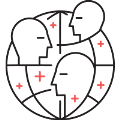 DID YOU KNOW?
DID YOU KNOW?
A December 2020 LinkedIn article by CEO and Chairman of Barnes & Noble Education, Mr Michael Huseby, predicted that the growing digital divide will become a focus of D&I for higher education institutions this year.
![]()
While the method of assessment might have changed, it has not dented our commitment to identify students via aptitude-based admissions. In fact, the number of applicants considered under aptitude-based admissions has increased by more than 23 per cent [in 2020].
Professor Bernard Tan, NUS Senior Vice Provost (Undergraduate Education)
MAKING DEGREES MORE ACCESSIBLE
University places, in many parts of the world, have traditionally gone to the academically-inclined or those from well-to-do families. But things are changing. Together with other local universities, NUS has been moving away from strictly grade-based to aptitude-based admissions in recent years. Rather than selecting only straight-A students, the University is increasingly assessing prospective students’ interest in the course they apply for, as well as their non-academic achievements in areas such as sports, the arts and community service.
This transition has continued even as COVID-19 forced admissions interviews and tests to be held online. Said Professor Bernard Tan (Science ’89), Senior Vice Provost (Undergraduate Education) of NUS, to
The Straits Times in May 2020: “While the method of assessment might have changed, it has not dented our commitment to identify students via aptitude-based admissions. In fact, the number of applicants considered under aptitude-based admissions has increased by more than 23 per cent this year.”

In line with this shift, NUS has introduced several initiatives aimed at taking in students whose path to University is outside the conventional Junior College (JC) route. For example, a special scheme launched in time for Academic Year 2019/2020 encouraged Singapore’s five polytechnics to each nominate up to 40 students with entrepreneurial abilities for admission to NUS. Selected candidates will get to benefit from NUS’ active industry partnerships and experiential entrepreneurial education, including the NUS Overseas Colleges programme.
Those with an aptitude or passion for the law will now have more opportunities to enter the NUS Faculty of Law as well, thanks to a new pilot initiative. As part of a broader effort to transform legal education, the Faculty will increase the number of shortlisted applicants to be considered for admission to its Bachelor of Laws programme for Academic Year 2021/2022. The top five per cent of students across all JCs and Millennia Institute who are keen to study law will be eligible for shortlisting, alongside the 800 or so whittled down each year through the regular admissions process.
Some 50 students — mostly from schools with lower representation in the Faculty of Law — are expected to be added to the shortlist annually this way, and will hopefully create a more diverse student body. “Inclusion and diversity in the student population does not only benefit those who earn a place in law school. It also benefits the entire cohort, by better reflecting the diversity of society as a whole and ensuring that diverse voices and perspectives are present in the classroom — as they are in life,” said Faculty of Law Dean Professor Simon Chesterman upon the announcement of the scheme.
BACK TO SCHOOL
More than 100 adult learners applied to NUS under the Advance@NUS admissions pathway in 2020, including Mr Eswaran S/O Manoharan, 26. The first-year Bachelor of Business Administration student tells The AlumNUS how the course has already helped him in his job as Managing Director of Kaizen Logistics.
“Pursuing a degree at NUS is one of the best decisions I have made for myself. The biggest advantage is that I am able to apply whatever I learn in school to my business in almost real time. For example, one module I took was on innovation strategy. I learnt that innovation does not have to be industry-shaking; it could be something small that solves a less serious problem but still be impactful in the long run. To improve Kaizen’s operations and processes, I built a technology platform for our cross-border logistics services, which used to be handled via email.
I would like to think that I contribute something to my younger course mates as well. While they read materials in lectures and tutorials, I can share my real-life experiences with them. I offer a different perspective on what it is like to be in the working world.
Having graduated from Nanyang Polytechnic with a Diploma in Business Enterprise IT in 2014, it was initially a bit of a challenge adjusting to formal learning again. I hit a few bumps trying to manage a business and school at the same time, but it helps that my team at Kaizen is able to work independently. This is a fantastic opportunity to acquire new knowledge and shape my business better. I’m glad I jumped at the chance the moment I saw it.”
Aware that there are many working adults who may have previously missed out on a university education due to financial or other reasons, NUS is also actively courting this demographic. In March 2020, the University launched its inaugural admissions cycle for the
Advance@NUS admissions pathway, under which adult learners who have rich professional experience but do not have a university degree can enter selected full-time undergraduate degree programmes at NUS. This pathway allows working adults to earn their first bachelor’s degree in highly-relevant fields such as business and engineering, so that they can broaden their knowledge base and skills and improve their future career prospects.
NUS School of Continuing and Lifelong Education (SCALE), which administers
Advance@NUS, believes that having adult learners take classes side-by-side with younger undergraduates is advantageous for both groups. “We envisage a positive multiplier effect from
Advance@NUS — adult learners can fulfil their personal aspirations of getting a degree, and the younger undergraduate students will have much to gain from our adult learners’ rich industry experience, maturity and motivation,” said Professor Susanna Leong (Law ’89), NUS’ Vice Provost (Masters’ Programmes & Lifelong Education) and Dean of SCALE, in a press release.
AN UNINTENDED BOON

Citing Ministry of Education figures,
The Straits Times reported that
17,500 students were enrolled in Singapore’s six autonomous universities (including NUS) in 2020, roughly 1,000 more than planned due to the disruption caused by the ongoing pandemic. The additional places went to Singaporeans who had initially planned to study overseas, as well as polytechnic diploma holders who opted to study instead of joining a weak job market.
A MORE LEVEL PLAYING FIELD
An ideal education system is one that uplifts all — where no one lacks educational opportunities, and everyone gets a fair shake at acquiring knowledge and skills to improve the trajectory of their lives. An undergraduate degree remains a prerequisite for many jobs, and university graduates typically command higher starting salaries and enjoy better employment prospects than diploma holders. As such, no one should be shut out of higher education, least of all those from financially-disadvantaged backgrounds.
In Academic Year 2019/2020, NUS awarded 3,441 bursaries and 1,954 scholarships to deserving undergraduate students, enabling them to pursue their academic aspirations, realise their full potential and achieve social mobility. As last year was especially tough for families impacted by the COVID-19 pandemic, the University provided extra financial support to students from these households in the form of the NUS Students Solidarity Fund. With donations from the NUS community, the Fund amounted to $1.6 million as of 1 September 2020, which was disbursed as one-time grants to some 3,100 students.
To complement the NUS Students Solidarity Fund and widen the coverage of financially-needy students receiving assistance, the NUS Students’ Union (NUSSU) also set up the NUSSU Unity Relief Fund in June 2020. This ‘for students, by students’ initiative, launched with $200,000 from NUSSU’s coffers and supplemented by student donations, offered a one-time payment of $250 to students facing financial hardship amid the crisis.
“Both my parents are self-employed — one as a stall vendor in a primary school canteen, and the other in the renovation industry — so their incomes were significantly affected during and after the Circuit Breaker. We had to dip into our savings to fund our living expenses,” recalls 22-year-old Ms Jocelyn Goh, a Year 3 student in the Faculty of Arts and Social Sciences. “The financial aid from the NUSSU Unity Relief Fund meant that I could cover my personal expenses for close to a month, which relieved some of the pressure off my family.”
3,441 bursaries and 1,954 scholarships were awarded to NUS undergraduates in Academic Year 2019/2020.
![]()
The financial aid from the NUSSU Unity Relief Fund meant that I could cover my personal expenses for close to a month, which relieved some of the pressure off my family.
Ms Jocelyn Goh, Faculty of Arts and Social Sciences student
ENABLING PERSONS WITH DISABILITIES
Another underprivileged group all too often excluded from higher education are persons with disabilities — not because they struggle with the academic rigour, but because the system is not designed to accommodate their needs. One way NUS addresses this problem is through the Hannah’s Blessings Bursary, which supports financially-needy undergraduates with special needs, particularly those with physical disabilities.
Admitting students with diverse backgrounds to university is one half of the D&I equation; the other half is making them feel included so they feel they belong there and what they say and do matters. To make its campus a safe and welcoming place for everybody, NUS has a network of offices and units dedicated to ensuring that the needs and preferences of different student groups are met.
The NUS Student Accessibility Unit (SAU), within the Office of Student Affairs (OSA), is one of them. Together with University colleagues, SAU provides a comprehensive range of support services and resources for students with disabilities and special education needs. Examples include helping students make alternative arrangements with course instructors before the start of modules; maintaining facilities with assistive technologies (such as PitStop @ Yusof Ishak House); providing wheelchair-accessible transport to ferry mobility-impaired students to and from classes; and finding suitable on-campus housing, co-curricular activities, as well as job and internship opportunities for them.
NEW NAME, SAME AIM
Until recently, SAU was known as the Disability Support Office. Ms Yuen explains that the name change reflects a “more progressive stance” towards supporting students with disabilities.
Lending a hand to this group are the student volunteers with NUS Enablers. Set up to champion disability inclusion, this student interest group offers buddy services to peers with special needs. “Alongside SAU, NUS Enablers promotes awareness for a more disability-inclusive campus culture and environment among the student community,” says Ms Agnes Yuen, Assistant Senior Manager at SAU. The Unit’s annual Inclusive Fest also brings together the entire NUS community for a series of experiential activities and sharing sessions by persons with disabilities, to help people understand how they can each do their part to build a more inclusive environment.
“Students with special needs are generally very appreciative and grateful for the individualised support they receive to ensure that their specific needs are met,” says Ms Yuen, adding that COVID-19 has not halted such support. “While students with physical disabilities appreciate not having to commute to and from school, those who thrive on interpersonal interactions may find it more daunting an adjustment to make.” For example, NUS Enablers introduced online bonding or game sessions between students with and without special needs. Some students had assistive devices delivered to their homes, while lecture captioning allows hearing-impaired students to follow the online course content.
![]()
Students with special needs are generally very appreciative and grateful for the individualised support they receive to ensure that their specific needs are met.
Ms Agnes Yuen, Assistant Senior Manager, NUS Student Accessibility Unit
RESPECT AND CONSENT
Since Singapore had its own #MeToo moment in April 2019, when then-NUS undergraduate Ms Monica Baey (Arts and Social Sciences ’19) came forward on social media with her story as a victim of voyeurism, the issue of sexual harassment or violence is being taken more seriously. A key indicator of this was the establishment of the NUS Victim Care Unit (VCU), the first of its kind in Singapore universities. It provides a central point of contact for students affected by sexual misconduct, and offers a private and safe place for them to seek support in confidence.
“NUS is committed to zero tolerance for sexual misconduct. VCU works alongside other University units to cultivate a safe campus environment — free from sexual and gender-based harassment — where students can live, study and enjoy the best of their educational years,” says Associate Professor Sandy Lim (Arts and Social Sciences ’96) from NUS Business School, who directs the VCU. Trained professionals are available to accompany victims to the hospital, police, court and other appointments, as well as give emotional and practical support, including referral to counsellors.
VCU also conducts community engagement and outreach activities, such as talks at first-year orientation programmes and campus residences, seminars on respect and consent, and management training sessions to promote trauma-informed protocols. Currently, the Unit is expanding its services to assist staff as well as students affected by sexual misconduct, with a name change — to NUS Care Unit (NCU) — soon to come.
PUT ON YOUR JEANS!

Take part in Denim Day this April! Spearheaded by the VCU, this event is held in honour of Sexual Assault Awareness Month, which aims to raise awareness about the misconceptions surrounding sexual assault and provide a visible demonstration of support for survivors of sexual harassment and assault.
Grounded in the belief that “it takes students to keep students safe”, Ms Carissa Cheow and three others formed
Students for a Safer NUS (
safeNUS) as a strategic partner to the VCU in October 2019. It is Singapore’s first fully-student-led organisation dedicated to this cause. Co-Founding Co-President Ms Cheow asserts that they are committed to “ensuring sexual violence remains consistently on our institution’s and community’s agenda and not merely a hot topic that will fade away once media cycles move on from it”.
In the short time that
safeNUS has been around, its 60-plus members have already initiated numerous ground-up projects. Some of these are a Warm Line and Support Group, a Sexual Assault First Responder Training course for NUS students, and a Sexual Climate Survey jointly conducted with the VCU to understand the prevalence of sexual misconduct at NUS.
safeNUS is also collaborating with the Association of Women for Action and Research (AWARE), Singapore’s leading gender equality advocacy group, to develop a resource to tackle image-based sexual violence.
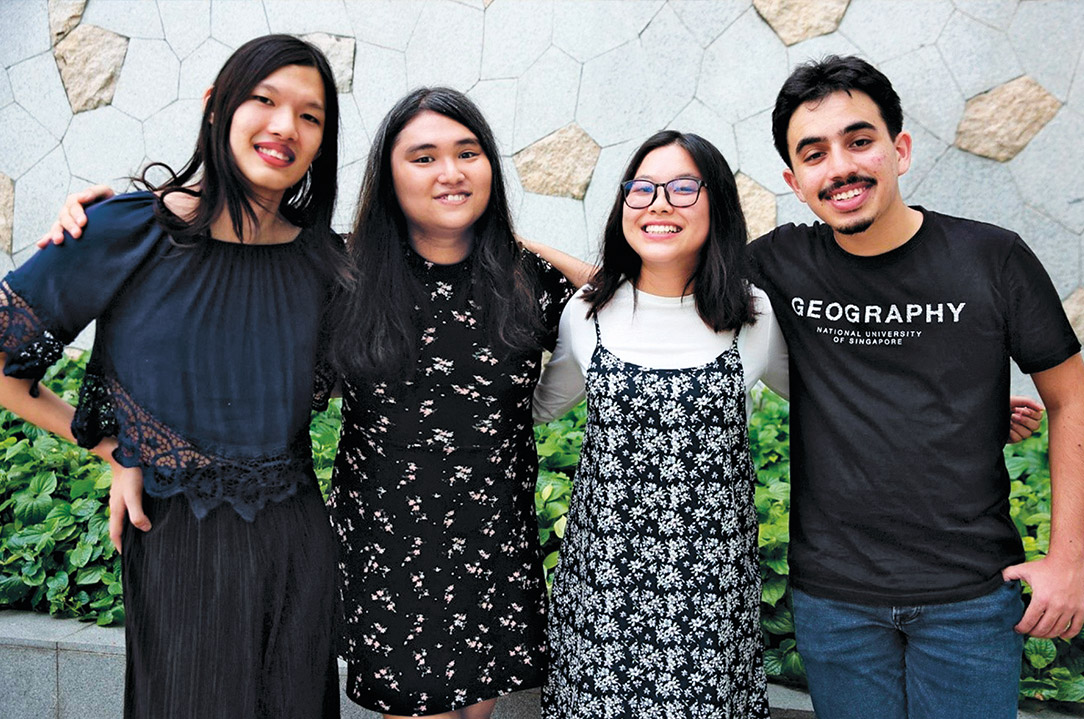 Ms Cheow (second from left) with her fellow co-founders of Students for a Safer NUS.
Ms Cheow (second from left) with her fellow co-founders of Students for a Safer NUS.
“Sexual violence in all its forms remains an unacceptably prevalent problem throughout our campuses, workplaces and communities,” says Ms Cheow, a survivor herself. She is pursuing a Concurrent Degree Programme in Bachelor of Social Sciences (Honours) and Master in Public Policy at NUS. “It is a systemic problem that affects all of society and originates squarely in deeply-unjust power structures that have enabled it to happen. To address sexual violence, we need systemic change. When we reconfigure the power dynamic, we allow more equal relationships built on mutual respect to emerge.”
![]()
To address sexual violence, we need systemic change. When we reconfigure the power dynamic, we allow more equal relationships built on mutual respect to emerge.
Ms Carissa Cheow, Co-Founding Co-President, Students for a Safer NUS
IN THE FIGHT AGAINST MENTAL HEALTH STIGMA
With the COVID-19 pandemic still raging, mental health — in addition to obvious physical health worries — has been pushed to the fore. Increasingly, people report feeling stressed, anxious, lonely or depressed. To see how NUS employees were coping, a Senior Management-commissioned staff well-being survey was carried out in July 2020. The results were analysed by a newly-created Mental Well-being Taskforce, who then came up with recommendations to address employees’ psychological and emotional needs.
“From the survey, we found that the majority of our employees were doing well, but close to 10 per cent reported severe or extremely severe symptoms of depression, anxiety or stress. Some groups were found to be more affected, including our younger staff, newer staff and foreign ethnicities,” says Ms Zheng Kaiwen (Business ’07), Senior Associate Director at the Office of Human Resources, who heads the Taskforce. She is one of nine members from the five different NUS bodies who form the Taskforce: the Office of Human Resources; the Department of Psychology; the Office of Safety, Health and Environment; the University Health Centre; and the Organisational Excellence Transformation Unit.
The Taskforce’s recommendations — which ranged from encouraging self-care to enhancing support programmes and improving awareness — were subsequently taken up and implemented by a new Health & Wellbeing Team (HWB). Led by Dr Andrew Tay (Medicine ’07), HWB sits under the Office of the President to drive the University’s health and wellbeing strategy. It signals the University’s commitment to protect the mental wellness of the NUS community.
As Dr Tay explains, “D&I is more than just a checklist of programmes or policies. It involves the respectful and genuine embrace of people of different backgrounds and perspectives, thereby fostering an environment where innovation, resilience and respect — the very values of NUS — are unleashed. In this trajectory, it naturally includes people on varying phases of their mental health journey.”
One initiative unveiled by the HWB this year is #AreuOK, a six-month campaign aimed at “driving resource awareness, addressing stigma on mental health, and setting a positive tone of psychological safety and empathy on campus — the hallmark of inclusivity”, says Dr Tay. He adds that staff are encouraged to utilise the Employee Assistance Programme for counselling and other support, while efforts are underway to train managers to overcome their discomfort in holding conversations on mental health with staff, among other wellness programmes.
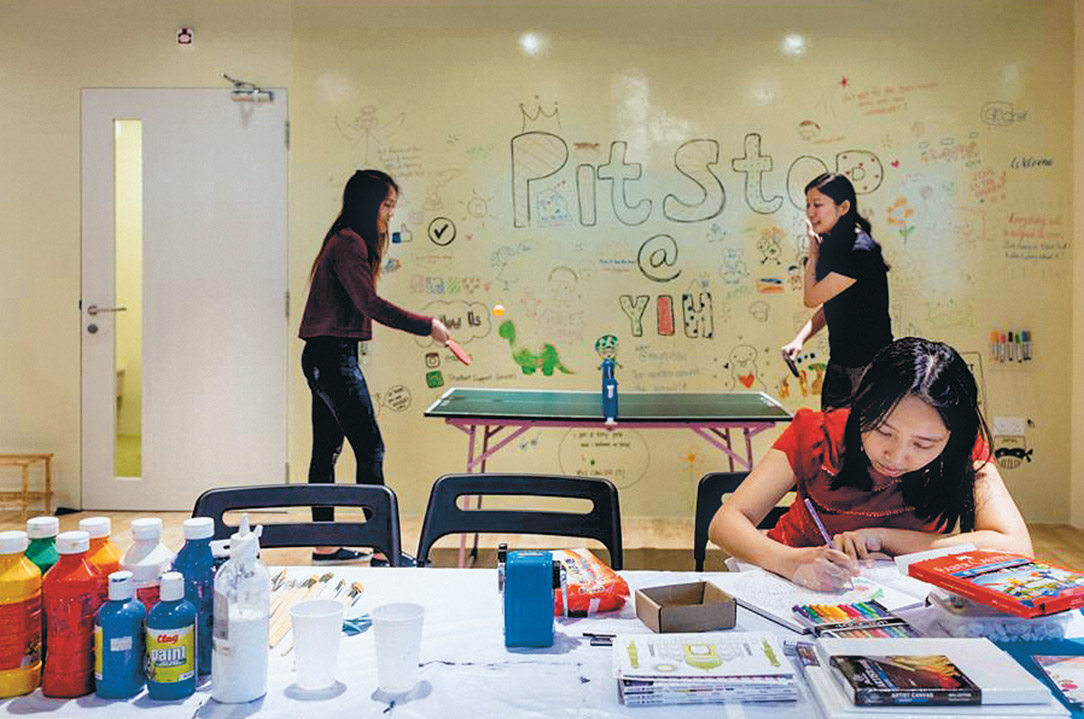
A HAVEN FOR STUDENTS
HWB is also focused on the mental health and wellbeing of NUS students, not just staff. To help students struggling with academic-related stress and other mental health issues, a variety of avenues are open to them:
At the University Health Centre (UHC), free counselling is available for students facing issues such as relationship problems, academic difficulties and low self-esteem. UHC also organises wellness talks and other outreach activities, including a ‘Workout from Home’ video series during the Circuit Breaker period.
The Office of Student Affairs (OSA), through its Student Wellness unit, has a team of dedicated staff who help students adjust to University life and deal with their myriad concerns. Students can also turn to Peer Student Supporters, who are trained in basic mental health literacy, for a listening ear.
PitStop, opened by OSA, is a dedicated space for students to unwind and engage in relaxing activities such as arts and crafts, games, or even a nap. There is also an assistive technology room for students with special needs. Besides Yusof Ishak House, a second PitStop space at the Faculty of Science is being built.
Started in 2020, the annual Wellness Festival is a campus-wide collaboration by OSA and the Faculties. Through workshops ranging from yoga to tote bag painting, students are encouraged to prioritise their mental health and self-care.
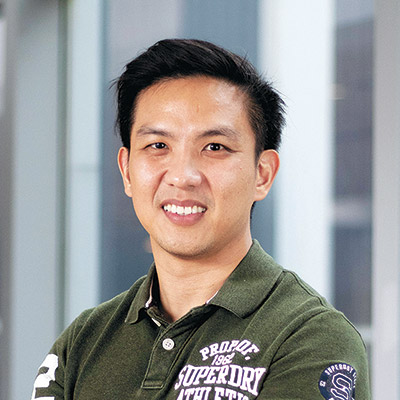
[D&I] involves the respectful and genuine embrace of people of different backgrounds and perspectives, thereby fostering an environment where innovation, resilience and respect — the very values of NUS — are unleashed. In this trajectory, it naturally includes people on varying phases of their mental health journey.
Dr Andrew Tay, Director & Head, Health and Wellbeing Team (Office of the President)
ADVANCING THE D&I CONVERSATION
The latest proof of the growing awareness around D&I came in February, when NUS revealed plans to revise its General Education (GE) curriculum. Set to launch in Academic Year 2021/2022, the enhanced GE curriculum will give incoming undergraduates a more holistic learning experience with the introduction of a new pillar, Communities and Engagement.
Under this pillar, NUS students will take part in community service projects (or design their own) to address issues of global and local importance, such as integrating marginalised groups into society, improving access to healthcare and education, caring for an ageing population, and destigmatising mental illness. As NUS’ Senior Deputy President and Provost Professor Ho Teck Hua (Engineering ’85) said in February, the enhanced GE curriculum will “grow social consciousness in our young leaders” so that they can “lead positive changes in society”.
SINGAPORE AND D&I: LESS THAN STELLAR
The inaugural Kantar Inclusion Index (2019) ranked Singapore as the
second-lowest globally for workplace D&I. Among the Singapore workers polled:
 24% had been bullied in the workplace in the past year
24% had been bullied in the workplace in the past year
32% were made to “feel uncomfortable” by their employers
44% were affected by “stress and anxiety” at work Only 2 Singapore companies — Singapore Airlines (31
st) and Singtel (35
th) — made it to the Refinitiv 2020 D&I Index, which ranks the top 100 most diverse and inclusive organisations globally.
Women represented 16.2% of board members in the top 100 primary-listed companies on the Singapore Exchange as of end-2019, lagging behind other international markets which had more than 25% women on boards.
In co-curricular endeavours as well, more and more undergraduates are joining student organisations centred on reaching out to the wider community and helping the less-privileged. Two such groups are the Developer Student Club NUS and the NUS Students’ Community Service Club, which spent last December developing an online platform to galvanise in-kind donations and painting the rental flats of low-income elderly households, respectively. Students keen on initiating a project to enhance the appreciation of marginalised communities and foster an inclusive culture can also seek funding through the OSA-administered Diversity and Inclusion Grant.
Elsewhere in the NUS community, alumni-led initiatives allow people to engage in honest, informed discussions on D&I-related matters, and force them to rethink their prejudices. WoW: In Conversation, for instance, is a women’s empowerment platform where distinguished female alumni are celebrated and can inspire others. Its founder, NUS Alumni Advisory Board member Dr Intan Azura Mokhtar (Science ’98), believes the platform has elevated the “visibility” of women. However, she qualifies, “Although we may have progressed as a society, we are still quite patriarchal. There is still some way for women to play a more significant and dominant role in strategic decision-making and charting the course for our society.”
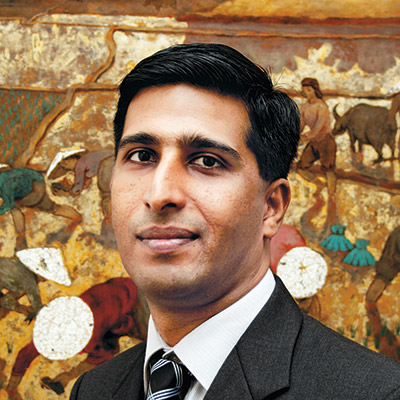
Addressing matters of inequality and marginality will ultimately benefit all of us, not just the ‘have-nots’.
Dr Mathew Mathews, Head of Social Lab and Principal Research Fellow, NUS Institute of Policy Studies
GETTING TO EQUAL
Unfortunately, Singapore’s envied reputation as a top global financial hub does not extend to the D&I sphere. A 2019 poll of 18,000 employees in 14 developed countries by Kantar, a leading data, insights and consulting company, found that Singapore was the second-worst performing country in terms of workplace D&I practices. Other similar findings show that in the case of D&I, much remains to be done (see “Singapore and D&I: Less Than Stellar”).
Dr Mathew Mathews (Arts and Social Sciences ’99), Head of Social Lab and Principal Research Fellow at NUS’ Institute of Policy Studies, reiterates this point: “Quite a bit of the research that I have been involved in has sought to highlight the existing divides in Singapore along various fault lines — whether religious, racial, or based on immigration status and income levels. On the surface, Singapore society looks like it has arrived on every front of inclusion, but the reality is that there is room for further progress.”
At a time when COVID-19 has made Singaporeans much more attuned to the needs and challenges faced by the migrant worker community, Dr Mathews is hopeful that it will spark greater empathy and momentum for D&I, even after the pandemic ends. “Addressing matters of inequality and marginality will ultimately benefit all of us, not just the ‘have-nots’,” he observes. “It is only when we learn to include people in our workplaces, neighbourhoods and friendship groups — even those who are very different from us — that we can tap onto our collective energies to make the world a better place.”